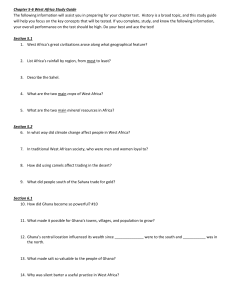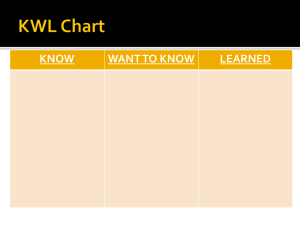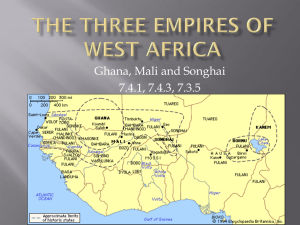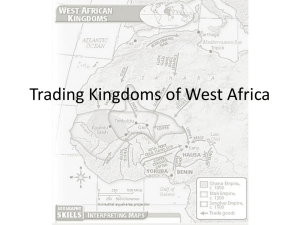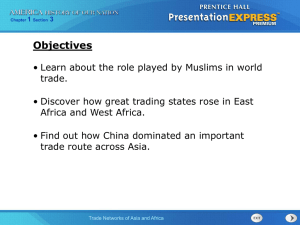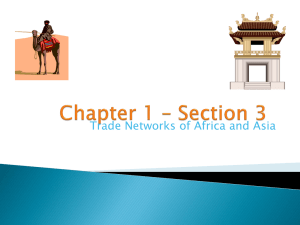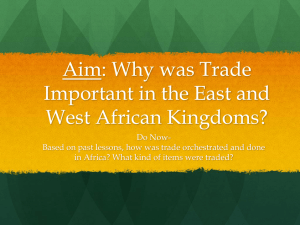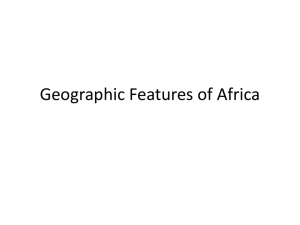GHANA Ghana was the first great African empire of the western
advertisement
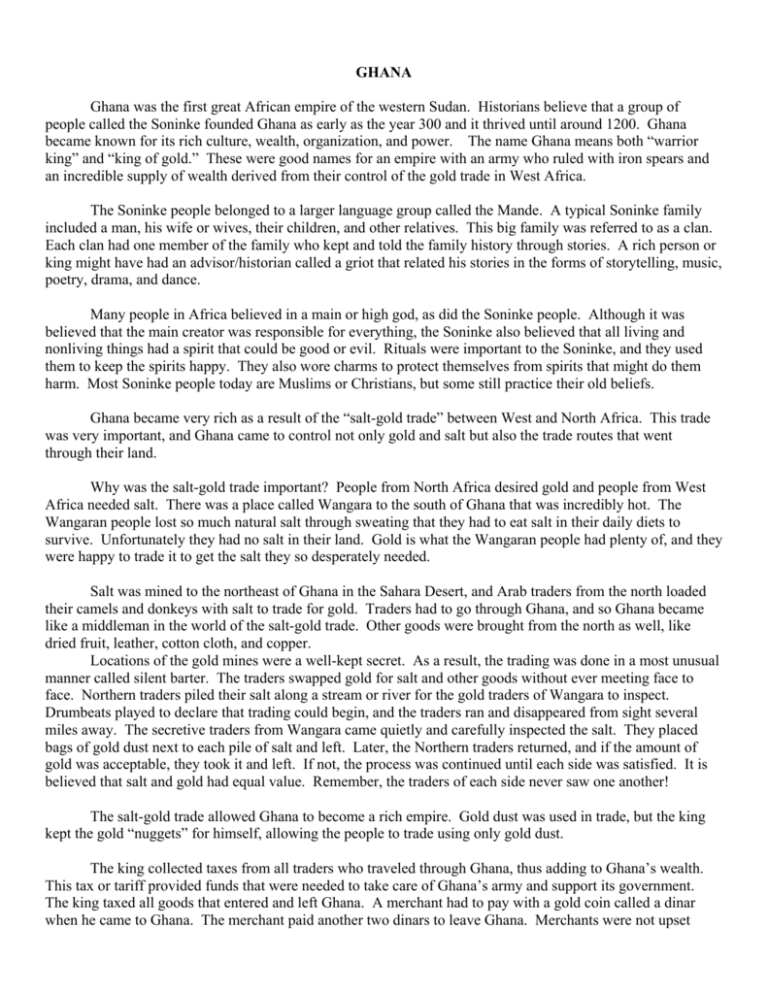
GHANA Ghana was the first great African empire of the western Sudan. Historians believe that a group of people called the Soninke founded Ghana as early as the year 300 and it thrived until around 1200. Ghana became known for its rich culture, wealth, organization, and power. The name Ghana means both “warrior king” and “king of gold.” These were good names for an empire with an army who ruled with iron spears and an incredible supply of wealth derived from their control of the gold trade in West Africa. The Soninke people belonged to a larger language group called the Mande. A typical Soninke family included a man, his wife or wives, their children, and other relatives. This big family was referred to as a clan. Each clan had one member of the family who kept and told the family history through stories. A rich person or king might have had an advisor/historian called a griot that related his stories in the forms of storytelling, music, poetry, drama, and dance. Many people in Africa believed in a main or high god, as did the Soninke people. Although it was believed that the main creator was responsible for everything, the Soninke also believed that all living and nonliving things had a spirit that could be good or evil. Rituals were important to the Soninke, and they used them to keep the spirits happy. They also wore charms to protect themselves from spirits that might do them harm. Most Soninke people today are Muslims or Christians, but some still practice their old beliefs. Ghana became very rich as a result of the “salt-gold trade” between West and North Africa. This trade was very important, and Ghana came to control not only gold and salt but also the trade routes that went through their land. Why was the salt-gold trade important? People from North Africa desired gold and people from West Africa needed salt. There was a place called Wangara to the south of Ghana that was incredibly hot. The Wangaran people lost so much natural salt through sweating that they had to eat salt in their daily diets to survive. Unfortunately they had no salt in their land. Gold is what the Wangaran people had plenty of, and they were happy to trade it to get the salt they so desperately needed. Salt was mined to the northeast of Ghana in the Sahara Desert, and Arab traders from the north loaded their camels and donkeys with salt to trade for gold. Traders had to go through Ghana, and so Ghana became like a middleman in the world of the salt-gold trade. Other goods were brought from the north as well, like dried fruit, leather, cotton cloth, and copper. Locations of the gold mines were a well-kept secret. As a result, the trading was done in a most unusual manner called silent barter. The traders swapped gold for salt and other goods without ever meeting face to face. Northern traders piled their salt along a stream or river for the gold traders of Wangara to inspect. Drumbeats played to declare that trading could begin, and the traders ran and disappeared from sight several miles away. The secretive traders from Wangara came quietly and carefully inspected the salt. They placed bags of gold dust next to each pile of salt and left. Later, the Northern traders returned, and if the amount of gold was acceptable, they took it and left. If not, the process was continued until each side was satisfied. It is believed that salt and gold had equal value. Remember, the traders of each side never saw one another! The salt-gold trade allowed Ghana to become a rich empire. Gold dust was used in trade, but the king kept the gold “nuggets” for himself, allowing the people to trade using only gold dust. The king collected taxes from all traders who traveled through Ghana, thus adding to Ghana’s wealth. This tax or tariff provided funds that were needed to take care of Ghana’s army and support its government. The king taxed all goods that entered and left Ghana. A merchant had to pay with a gold coin called a dinar when he came to Ghana. The merchant paid another two dinars to leave Ghana. Merchants were not upset about this tax because some of the gold collected was used to pay for protection of the merchant traders. This taxation system made Ghana a safe place for travel and trade. Ghana continued to thrive until the mid 1200s. It started losing power when Muslim raiders began attacking areas across the empire. The attackers’ main goal was to convert as many people to Islam as possible, but they also wanted control of the salt-gold trade. Ghana fought the Muslims for more than thirty years and tried to continue ruling their empire. The empire began to crumble as many smaller provinces began to break off to form their own kingdoms. During this time, Ghana was also plagued by a horrible drought. People began to move out of the area in search of a better area to live. A new and more powerful empire rose in Ghana’s place. What do you think this new empire was called? MALI The Empire of Mali was founded in the mid 1200s and lasted through the late 1400s. Ancient Mali was located in western Sudan. The name Mali means “where the king resides” or “hippopotamus.” The people of Mali were called Mandinkas, Malinkes, or Mandingoes. They lived in kafus, small communities headed by a chief or sultan. The original small communities of Mali were not in a position to control trade as Ghana had done; therefore the Sudan and trade routes were taken over by the Soso people. Sumanguru, a very greedy leader, led the Sosos. Sundiata, a son of one of the Mandingo chiefs, was able to rally the people of Mali against Sumanguru. In 1240 the two armies met in a fierce battle. Sundiata was victorious and earned the title “Lion King of Mali.” In his lifetime, Sundiata was able to bring all of the kafus together and turn Mali into a rich empire based on the salt/gold trade. Mali’s greatest growth came under a king named Mansa Musa, who ruled from 1307-1332. The word Mansa refers to king, emperor, chief, or sultan. The name Musa means Moses and he is often referred to as “the Black Moses.” Mansa Musa encouraged knowledge and the teachings of the Islamic faith. He invited Arab scholars to come to Mali and study. Timbuktu, the capital of ancient Mali, became a center of learning for scholars throughout the Muslim world in Africa. Mansa Musa created an empire where he used armies to maintain peace. The soldiers were also used to protect trade routes and increase the size of Mali. Mansa Musa was very good to his officers and soldiers who kept his empire peaceful. Mali became known to the world when Mansa Musa went on his hajj, or pilgrimage, to Mecca. He gave away so much gold that its value dropped because there was so much of it! Mansa Musa’s trip became one of the most famous and well documented in history. As Mali continued to grow in size it became too difficult to control. After the death of Mansa Musa his son, Maghan, took control of the Mali empire. Eventually warriors from outside of Timbuktu attacked this great city. Timbuktu’s mosques, or places of prayer, were burned down and marketplaces were destroyed. Mali continued as an empire for another 200 years, but its Golden Age was over. What was the next great empire that replaced Mali as the most powerful trading empire in West Africa? SONGHAI Songhai became a major West African empire as Mali’s empire began to crumble in the late 1400s. Ali-Ber, a fearless warrior, began ruling Songhai in 1464. His name meant “Ali the Great,” and he lived up to his name! He expanded the empire by first conquering Timbuktu, then spreading in all directions to capture all of the areas of the former empire of Mali. Ali-Ber continued capturing more land, and his empire spread from Gao to Timbuktu. Songhai divided its great land holdings into five large provinces. Each province had its own governor, courts, and army to make sure people paid taxes. Each city in the province had its own mayor. Under this system Songhai became the most well-organized empire in ancient West Africa. Songhai grew rich like Ghana and Mali by controlling trade routes across the Sahara. The Songhai people settled along the middle area of the Niger River. They had war canoes along the Niger River to protect their trading cities from raiders. The two groups of people who lived along the Niger River were the Sorko, masters of the rivers, and the Gabibi, masters of the soil. The city of Gao in Songhai was rich in gold, and the people traded their gold with the Muslim merchants who visited this area. Many scholars came to study in Gao, which later became the capital of Songhai. The Songhai empire did not last long. The ruler of Morocco in North Africa wanted to capture Songhai. In 1591, the ruler sent his soldiers into the Songhai empire. The Moroccans fought with guns while the people of Songhai fought with swords. Songhai could not defend itself from the Moroccans, who had better weapons. The great Songhai empire was brought to an end by this fighting, drought, and disease. The Songhai empire became divided into several small states. The trade routes from the empire were still used, even though the empire of Songhai was no longer in power. Warfare continued in the Sudan region for many years. The area was very weak because of the fighting. Eventually the Portuguese, sailing along Africa’s West coast, created new trade routes and replaced the overland paths. No other nation in West Africa was able to achieve the greatness of the empires of Ghana, Mali, or Songhai.

